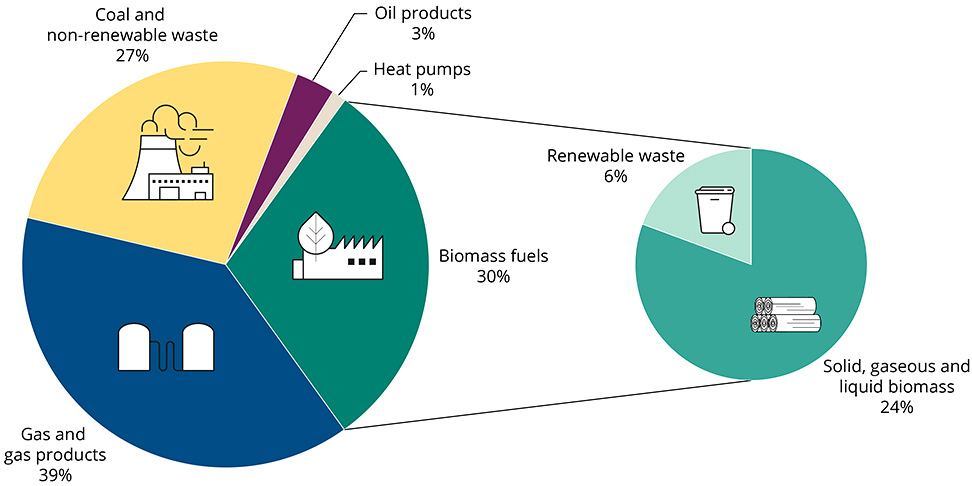Heat is the largest single form of energy demand across the globe, and it will play a role in the effort toward a decarbonised, more sustainable future.
Across the European Union (EU), significant strides in decreasing greenhouse gas emissions have been made, with a 20% decline between 1990 and 2020. Nonetheless, in order to realistically achieve more ambitious emissions targets, a major transformation in the way individuals manage energy outputs like heating and cooling will be needed.
According to the International Energy Agency (IEA), more than half of all energy demand is linked to heating water and industrial processes. Therefore, decarbonising the heating sector is crucial to achieving net zero climate goals.
 Figure 1: Gross EU heat production by fuel in combined heat and power and district heating plants, 2020. Source: ESTAT (2022) and EEA.
Figure 1: Gross EU heat production by fuel in combined heat and power and district heating plants, 2020. Source: ESTAT (2022) and EEA.
One promising solution that is being used to address the challenge of greenhouse gas emissions is heat pumps, with sales in the U.K. up almost 33.8% in 2022. Furthermore, heat pumps have the potential for making the EU less dependent on foreign energy imports, particularly for meeting demand for gas in buildings. In accordance with government research in the U.K., 14%-20% of heating demand in the U.K. could be cost-effectively met by heat networks by 2030 and 43% by 2050.
Several other innovative greenhouse gas emissions reduction trends are emerging across the market, including biogas and waste heat recovery, hydrogen utilisation in existing gas infrastructure, hybrid solutions combining electricity and green gas, and carbon capture and sequestration for high-temperature processes in industries like steel and cement.
Also, worth considering are heat networks, which distribute low-carbon heat across urban areas or industrial clusters through the development of industrial-scale hydrogen boilers or industrial heat pumps. The U.K. government aims for a significant development of heat network zones to begin in earnest in 2025, presenting a demanding timeline for procurement processes and construction. Questions remain about the requirements for connecting to the network, including the involvement of large commercial or public sector buildings and industrial producers of waste heat.
How Will Projects Be Financed?
Creating the right market environment and incentives is key for the development and uptake of sustainable energy solutions in the U.K. and EU. Various project funding vehicles can be employed, ranging from wholly private sector solutions to entirely publicly funded programmes. Governments in some countries provide subsidies for consumers’ energy efficiency efforts like retrofits and heat pumps. It is essential to design taxes and tariffs carefully to incentivise consumers and businesses to adopt a wide breadth of sustainable energy solutions — including, for example, heat pumps in residential buildings.
In the U.K., the Heat Networks Investment Project (HNIP) is a government-funded programme aimed at increasing the number of heat networks, delivering carbon savings and fostering a sustainable heat network market.
Moreover, initiatives such as the European Energy Programme for Recovery (EEPR) have been instrumental in funding critical sustainable energy infrastructure projects, including offshore wind, solar, and carbon capture and storage projects.
Private investors and businesses will likely play a pivotal role in funding sustainability-focused energy initiatives, with the potential to drive a significant amount of investment capital towards net zero objectives.
The road ahead is challenging but essential for achieving a sustainable and climate-resilient future. In this evolving landscape, companies like 1898 & Co. play a crucial role in supporting clients as they navigate policies, design, construction and commissioning for sustainable energy projects, like those involving heat pumps and heat networks.
1898 & Co. consultants provide independent technical assessments and due diligence of projects, focusing on risks, operations and maintenance, third-party relationships, and environmental, social and governance (ESG) — all factors that can contribute to successful project execution.
In this era of decarbonisation, a qualified partner that knows where the key technical risks lie for sustainable energy projects can mean the difference between an endeavour’s success or failure.




